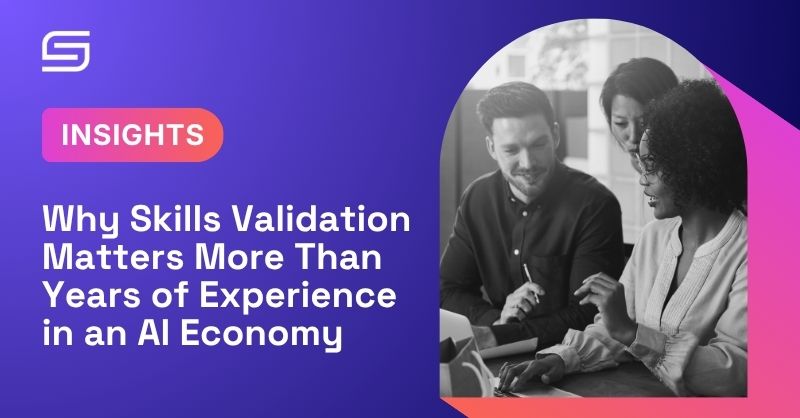Why Skills Validation Matters More Than Years of Experience in an AI Economy

The enterprise tech world has quietly entered a strange phase. Leaders still ask for engineers with ten years of experience, even though the systems those engineers once mastered barely resemble the systems they are responsible for today. The assumption is that more years mean more readiness, but that thinking is starting to shift, and in many cases, it is actively hurting teams.
Years of experience once signaled exposure, maturity, and depth. Today, it often signals something else entirely: the era someone was trained for. In an AI-first environment, the era someone comes from matters just as much as the skills they bring. Experience can be an advantage, but it can also hold someone in place when the landscape around them has already changed.
The Hidden Liability of Deep Experience
The individuals who struggle most with AI-driven systems are often not the newest engineers. They are the ones whose instincts were shaped in a world where systems behaved predictably, where logic was stable, and where architecture rewarded memorization and pattern repetition. AI disrupts those familiar cues. The “right answer” changes as models learn, workflows shift week to week, data behaves unpredictably, and problems rarely resemble the ones engineers have solved before.
When engineers rely on instincts built for an earlier era, they don’t slow down because they lack experience. They slow down because they have the wrong experience for the environment they now operate in.
AI Has Created a New Currency: How Fast You Can Unlearn
In an AI-driven enterprise, success depends less on accumulated years and more on the ability to release outdated assumptions. The strongest performers are not defined by the length of their résumés but by their willingness to adopt new mental models and adjust their thinking as systems evolve.
Years of experience cannot measure how someone updates their thinking. But understanding how someone approaches unfamiliar or shifting conditions can. The goal is not to test for technical trivia, but to reveal how someone thinks when the system refuses to behave as expected, how they interpret signals, adapt under uncertainty, navigate ambiguity, and make decisions when the answer is not obvious. These qualities determine readiness inside AI-shaped environments.
The Resume Tells a Story. Real Capability Tells the Truth.
This is why Smoothstack rejects the idea that experience alone predicts readiness. Smoothstack validates capability by putting talent in situations that imitate the real failures, pressures, and ambiguities of enterprise systems. We see how they interpret unfamiliar signals, how they adapt when the path forward is not obvious, how they collaborate when the workflow is not linear, and how they reason when the answer is not in the documentation. This provides a truer measure of readiness than any résumé ever could.
The Future Enterprise Will Be Built on Skills, Not Tenure
Enterprises that continue to prioritize experience-first hiring will keep wondering why their AI initiatives stall. They will keep searching for talent that feels senior on paper while overlooking people who can actually meet the demands of modern systems. The organizations that lead will take the opposite approach. They will hire for demonstrated ability, promote based on contribution, and value mental flexibility over historical familiarity. Their teams will not rely on what they once knew, but on what they can do today.
Smoothstack develops that kind of talent: people who earn their place through capability, who stay current because they are trained to adapt, and who thrive in environments defined by continuous change.
Experience built the last generation of enterprise systems. Capability will build the next.
Let’s Build Your Team
Connect with the Smoothstack team to learn how to close your digital skills gap with a custom-trained team.